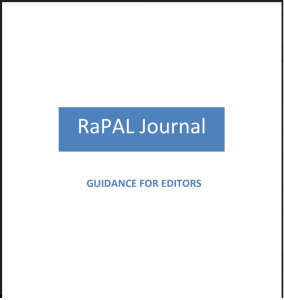Write with Us
This is an invitation to anyone involved in the field of adult literacy, numeracy and ESOL education to write and share their ideas, practice and evidence with RaPAL readers in full digital format.
We encourage and support those new to publication, as well has having a section with refereed journal status, to utilise mulitmedia expression and dissemination. The RaPAL network includes approximately two hundred managers, practitioner researchers, researchers, teachers, tutors, students and librarians in adult, community, further and higher education in the UK. It also has overseas members in Canada, USA, New Zealand, Australia, South America, Europe and Africa.
The RaPAL network produces a digital journal two times a year. We usually publish a Conference edition, an Open edition and/ or a Themed edition as set at the Annual Editorial Meeting. RaPAL welcomes contributions linking research and practice: articles, reviews, reports, commentaries, letters, podcasts, cartoons or other multi-media which reflect the range of activities and interests of those involved in this field. By writing for this network you will have the opportunity to refine your ideas and disseminate to the field. Guidelines for guest blogging are found below.
For RaPAL, research involves asking questions, trying to answer them in practice, reading around and asking other people, recording what we find, developing ideas, changing them, and writing and sharing ideas in many different ways. We think that these processes should be open to students, teachers and tutors as well as to paid researchers. They often underpin the day-to-day reflective and evaluative work of practitioners but are not usually recognised as research activity.
Journal Structure
We have decided to retain the three section structure plus reviews introduced in 2002-3, as a means of addressing the emerging needs in this field:
Ideas for teaching
Descriptive and reflective pieces on teaching and learning to meet the needs of current teachers and tutors in this diverse international field. The contributions must demonstrate democratic practice. At up to 1000 words, this is a good place to start if you are new to publication.
Developing Research and Practice
An open-ended category for a varied range of contributions from your active research and practice. We want to include articles which show people trying out ideas and pushing back boundaries alongside analysis, reflection and critique. Articles are 1000 – 2000 words, including references.
Research and Practice: Multi-disciplinary perspectives
An academic section for more sustained and developed pieces of theoretical and empirical analysis from experienced writers about research, policy and practice which has refereed (peer-reviewed) journal status. Written in an accessible style for general readership at up to 4000 words including full references.
Reviews
Reviews of publications of interest and value to the field. This is a good place to start if you are new to writing.
Reviews and reports of books, articles, and materials including CD should be between 50 and 800 words long. They should clearly state the name of the piece being reviewed, the author, year of publication, name and location of publisher and cost. The review is based upon your experience of using the book, article or materials in your role as a practitioner, teacher trainer, and researcher or as a student.
Guidelines for Contributors
We welcome contributions for each of these sections and are happy to discuss your ideas and proposals with you. We want the RaPAL Journal to continue its vibrant tradition of publishing views from all parts of the field. This page gives a general overview of writing for RaPAL and more detailed guidance is available in the following links if you have a piece you would like to submit:
General
- Writing for RaPAL must be in a readable, accessible, clearly explained style aimed at a diverse and international readership.
- If you are writing about individuals or groups you must follow the usual ethical guidelines, seeking permission whenever possible and in all cases representing people fairly.
- We are always looking for articles which link research and practice in some way. There are many possibilities and we do not set hard and fast rules about how this should be done.
- RaPAL articles should encourage readers to question dominant or taken for granted views of literacy, numeracy and ESOL. We would, for example, challenge views which fail to acknowledge the abilities of learners to be actively involved in developing and evaluating practice.
Specific Pointers
- When you submit your work, please indicate the intended section for publication.
- Articles should have a title with clear headings and subheadings; and must contain a clear introduction, indicating the scope of the piece.
- Particularly for section 3, the article should:
relate to the practice of learning or teaching adult literacies (in any language);
relate to research either by itself being a report of your research study and/or showing critical links to related research work;
provide ‘ critical’ analysis of the topic, involving theoretical underpinnings; and
be coherent with a clear structure, explanation of any terminology, use of examples and the usual referencing conventions (use the Harvard referencing system and make sure that all references are in alphabetical order and complete).
- Illustrations, graphic material, audio, video, links and other multimedia are much appreciated as the journal is digital. Please consult the editor about preferred formats.
- Your article must be submitted electronically as Word files or pdf attached to emails.
- Please provide covering information with your name, title, and contact details (postal address, e-mail address and phone number). It is very important that you also provide a short 2-3 line biography to accompany the article. We like to encourage correspondence between readers and writers and if you would like readers to get in touch with you, please provide contact details at the end of the article.
Editorial Procedures
- All contributions are peer reviewed by researchers and practitioners in the Editorial Group. The reviewing for section three is done by an experienced researcher and two additional researcher practitioners and focuses on the criteria noted above.
- Feedback is provided by the editor within eight – ten weeks of receiving your text and constructive comment (and notes to be of use in its development) are made if appropriate.
- If the article is accepted, once the amendments have been made, the editor will work on a final edit. We may make minor alterations ourselves and the final version will be sent to you for checking before it goes to print.
Contributions should be sent to:
The journal co-ordinators: journal@rapal.org.uk after checking the detailed guidance in the links above. We are happy to discuss ideas with potential contributors before they submit a piece.
Guest Blogging
Membership of RaPAL is usually a condition of participation. We are interested in topical writings which are evidence based and demonstrate improvement and development of English and Maths to problem solve in every day lives in any context, including technology rich environments. Contributions should reference their client and evidence base, theoretical research underpinnings, and policy and regulation environment. Publication is not guaranteed. Please send proposals with a brief bio outlining you or your organisation’s experience in the field of adult literacies to webweaver@rapal.org.uk. The basis of links to other organisations are made explicit and in accordance with our guidelines.
Copyright
Authors usually give the copyright to RAPAL on the understanding that the journal can be freely copied by readers for educational purposes. Please see PLS Clear on the Journal page for more information about permissions.




